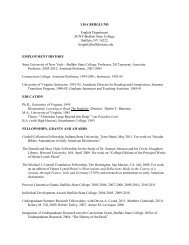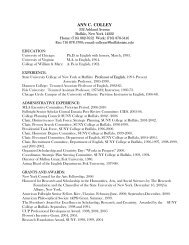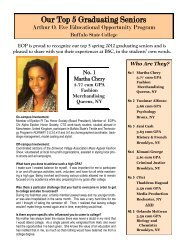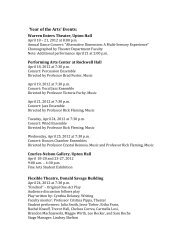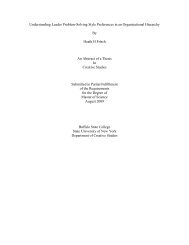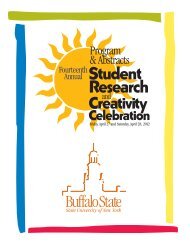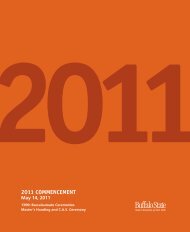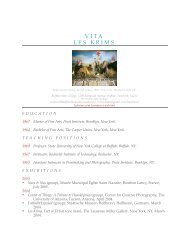POLITICS VERSUS SCIENCE: APPORTIONING ... - Buffalo State
POLITICS VERSUS SCIENCE: APPORTIONING ... - Buffalo State
POLITICS VERSUS SCIENCE: APPORTIONING ... - Buffalo State
Create successful ePaper yourself
Turn your PDF publications into a flip-book with our unique Google optimized e-Paper software.
1995: 233) living under weltbürgerrecht [world/cosmopolitan law] (Habermas, 1999:<br />
xxvi). There is a sense that Europeans, founders of the modern nation-state, are in the<br />
process of inventing a new kind of government, one based on shared norms rather than<br />
the power of the state. (Or neo-medievalism, as it is sometimes described in the<br />
literature!)<br />
Critics of cosmopolitanism, however, point to its base in rational enlightenment.<br />
Policy networks depend upon shared rules and norms; the incentive for compliance boils<br />
down to the notion that it is the way people who “reason” would want to live.<br />
(Habermas' now famous unshakable faith in "reason.”) This point of view has been<br />
ridiculed as naive by conservatives (whether the majority of the polity can be reasoned<br />
with and will, in turn, reason with others, is a philosophical conundrum generating as<br />
much debate today as it did in the 18 th Century) and ethnocentric (whose values?) by<br />
postmodernists.<br />
What is the prospect, then, for a food safety regime governed by policy networks?<br />
THE EFSA: GOVERNING THROUGH THE INVISIBLE<br />
COLLEGES OF POLICY NETWORKS<br />
Although only time will be reveal whether Europe is inventing a model for<br />
postnational governing, our narrower task is to understand the efficacy of policy<br />
networks in the European food safety regime. Fortunately a great deal of work has been<br />
conducted by sociologists who have focused on the interaction of scientists or science as<br />
a social system.<br />
Price (1963), Storer (1966), Kuhn (1970), and Crane (1972), social constructivists<br />
(Lievrouw et al. 1987), view science as a social organization guided by a set of shared<br />
28




